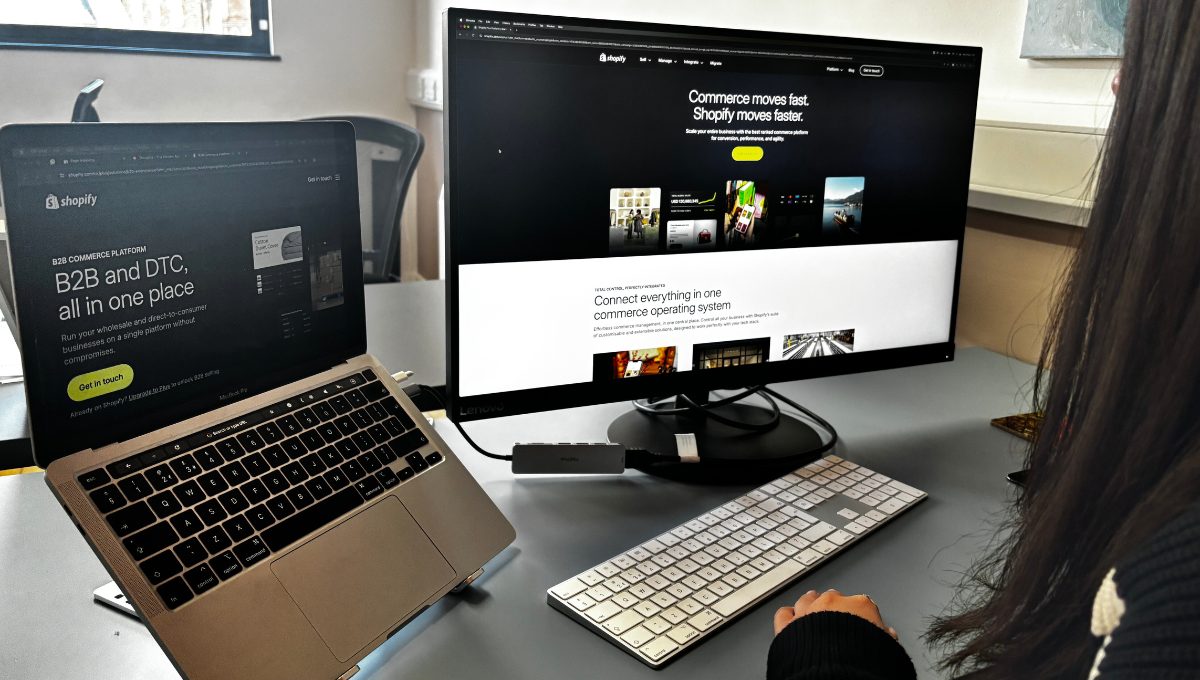Shopify is renowned for being the best ecommerce platform for B2C businesses, thanks to its easy to use interface and endless offerings of features and functionality. With a little bit of training, anyone can navigate the settings of a Shopify store and that’s what we love so much about it. Any clients that come to us requiring a rebuild or replatform for their ecommerce store, the likelihood is we’ll recommend Shopify to them as we know what it’s capable of and the benefits it can bring to B2C businesses.
Recently however, we’ve been exploring the benefits of Shopify B2B and how this works for B2B ecommerce businesses. You can expect to find out;
Table of Contents
First Things First, What Is B2B Ecommerce?
Imagine you’re down your local high street and you’ve popped into Boots. There’s rows and rows of beauty products available to shop, the majority of which are manufactured by other brands, not Boots themselves. For Boots to get this stock in their shops, they need to purchase it from the manufacturer, which is usually done through an online sales portal. This is B2B ecommerce.
Simply explained, it’s the process of one business selling their products directly to another business, usually a retailer. The retailer then sells the product in their physical store, where it is then purchased by the consumer.
Skinnydip is a good example of this. They have their own ecommerce Shopify website where they sell their phone cases and accessories directly to customers, however you can also find them in physical stores such as New Look and Boots. That’s because Skinnydip has a wholesale offering, allowing retailers to stock their products in their shops.
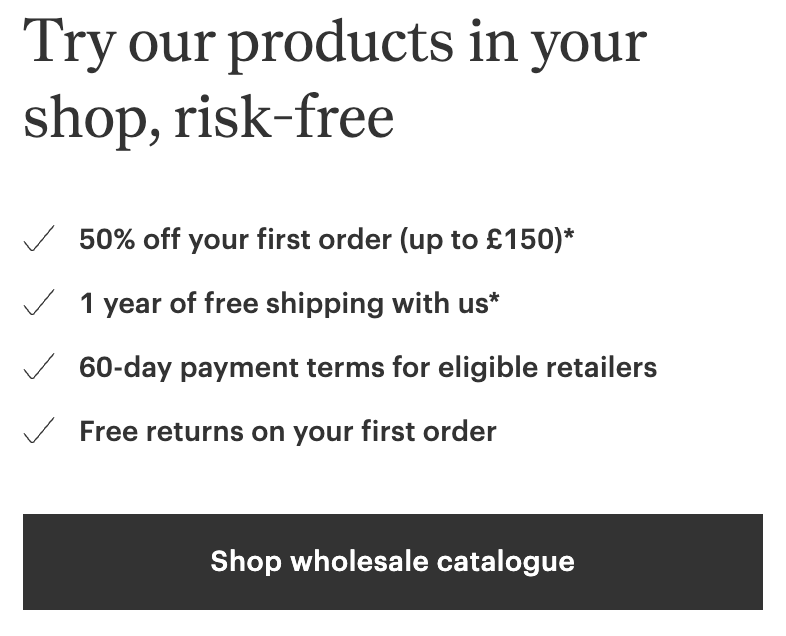
As mentioned, retailers typically order these goods from the manufacturer via an online sales portal. This means they can simply log in, see what products are available and reorder their stock without having to speak to a sales rep. It’s a quick and easy way for the manufacturer to make sales and an easy way for the retailer to manage stock.
One of the biggest challenges B2B companies face however lies in the core of B2B sales: product ordering, payment, configuration and support. A survey carried out by Deloitte Digital found that the No.1 priority for B2B companies was investing in an ecommerce platform that allows them to sell products and services online.
Businesses found that they needed a platform that made complex ordering processes user-friendly, allowed customers to browse products at their convenience from custom catalogues and provided real-time inventory information, amongst other things. Along came Shopify Plus B2B, a solution that would provide them everything they needed and more.
Why Choose Shopify Plus For Your B2B Ecommerce Website?
You might be wondering, ‘why would I choose Shopify for a B2B website’? And we get why you might ask that. Shopify is primarily known for being a B2C platform and many won’t immediately think of it as a go-to solution for B2B needs. In 2022, Shopify identified B2B as a huge growth opportunity for ecommerce businesses however saw it wasn’t being used to its full potential due to the manual and archaic sales process involved.
So they took matters into their own hands and developed B2B on Shopify to simplify the process and help merchants get their products in front of new customers. 3 years later and Shopify’s wholesale offering has been a huge success, with continuous updates and improvements being rolled out.
There are various other ecommerce platforms out there that also offer B2B functionality such as WooCommerce, Adobe Commerce and Magneto. We often recommend Shopify to clients however due to its user-friendly experience and extensive range of apps and features that make scaling stores and managing operations effortless. This doesn’t mean however that other platforms don’t offer valuable solutions. We’ll always work with a client to understand their preferences and find the right fit for their ecommerce strategy.
How To Get B2B Functionality On Shopify
For merchants looking to build a high performing B2B store on Shopify, it’s going to require a Shopify Plus subscription. We’ve seen users asking questions online about what B2B apps they can install on a Basic Shopify plan to create a wholesale store and while yes, you can use this method, there are limitations.
Some of these apps that offer B2B solutions aren’t as integrated into Shopify and have limited features compared to the native functionality of Shopify Plus. Using third-party apps can be a more cost-effective solution however and for smaller-scale wholesale businesses, it might just offer the functionality needed.
For larger scale businesses trading with hundreds of customers across multiple locations, a fully functional B2B ecommerce store on Shopify is going to be more beneficial. This will mean making the more costly upgrade to Shopify Plus however.
In the UK, an Advanced Shopify Plan will cost you £344 a month or £3,108 a year. Plus plans however start at $2,300 USD a month for a 3-year contract.
Shopify recommends that you upgrade your store to Shopify Plus when your online sales reach around $80,000 USD a month. As a more complex and higher volume business, Shopify switches you to a variable platform fee that is based on your revenue and business model. This makes it difficult however to immediately understand what your overall monthly cost will be without talking to a member of the Shopify sales team.

It’s also worth noting that businesses who don’t use Shopify Payments as their main payment gateway and opt for a third-party processor instead, a fee will be applied to each transaction to cover the charge for Shopify to maintain the integration.
While the price may seem high, merchants can expect to make savings in other areas with Shopify Plus for B2B. Every Shopify store, no matter what plan they’re on, must pay transaction fees whenever a customer makes a purchase. Merchants on a Shopify Basic plan can expect to pay a 2% card fee, whereas those on an advanced plan pay 1.5% per transaction. On top of this, merchants have to pay third-party transaction fees for all orders that aren’t processed through Shopify Payments, which can range from 2% to 0.6% depending on the plan.
On a Shopify Plus plan however, these transaction fees get even smaller, especially for businesses using the platform for B2B. On all B2B transactions made on Shopify Plus, there is a transaction fee of 0.18%. This lower fee can provide significant savings for businesses that can process a high volume of transactions.
This is just one example of the Shopify Plus benefits merchants can experience. Not only does Plus allow you to sell wholesale, but you can customise your checkout, install exclusive apps and access automation tools – just to name a few.
Once signed up to Shopify Plus, you’ll be given the option to have one online store for both your B2C and wholesale offering (with a separate B2B checkout) or a dedicated B2B store to keep operations separate. Choosing to have a single store for both your B2C and B2B operations means that you only need to worry about managing content, product catalogues and order fulfilment all from one website. It can also save costs, reducing the need to pay for licenses and apps for two separate stores.
Benefits Of Shopify Plus For B2B Ecommerce
We’ve already mentioned a few Shopify Plus benefits, but let’s dive into further detail on the Shopify Plus B2B features that merchants can utilise to improve operations and drive growth.
Custom Shopify Storefronts
The opportunities to customise and personalise your storefront are endless with Shopify Plus. You can even go as far as personalising content for every buyer. Want to show a buyer a specific message that’s tailored to them? No problem. Do you have a set of buyers who make repeat purchases of a particular product? You can create a unique marketing campaign or a personalised experience that’s shown just to them.
B2B ecommerce businesses looking to expand into new markets and trade in international countries can also benefit from this feature. With multiple Shopify storefronts, merchants can create a country specific TLD and tailor their website to the unique needs of each market, offering different product offerings, pricing structures and targeted marketing strategies. All of this is easy to manage in Shopify’s interface, meaning all merchants can take advantage of this approach no matter their technical experience.
Shopify offers what they call an ‘out-of-the-box’ B2B theme. Whilst this can be adapted to display the content you want, for the best custom solutions you’re better off hiring a web developer to build a custom storefront with Liquid.
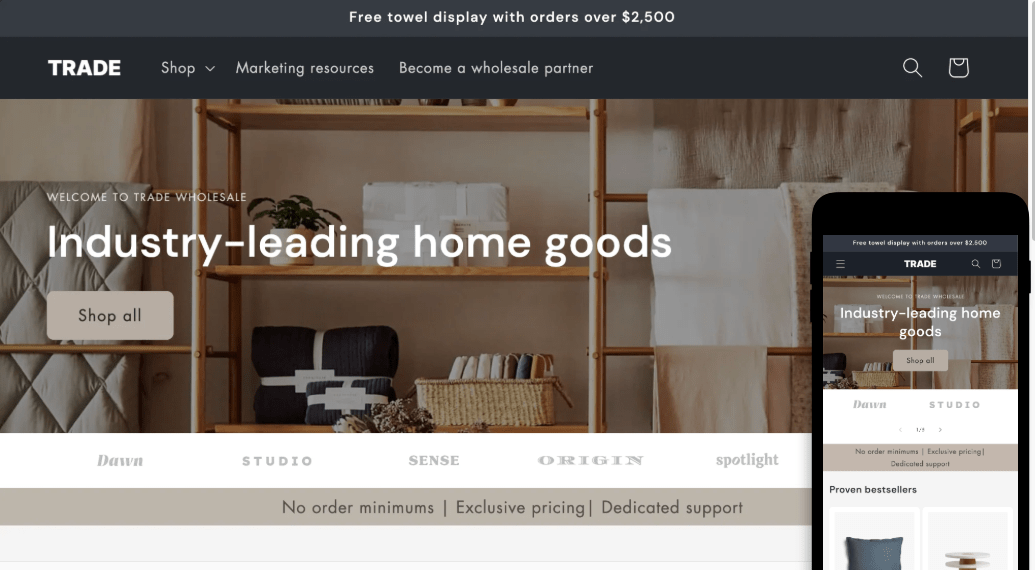
Image source: Shopify
Customer-Specific B2B Catalogues
We’re sure you know that as a business, it’s important to build and maintain strong relationships with your customers. In the B2B ecommerce landscape, this comes in the form of offering exclusive products and pricing to specific customers. Doing so means you’re going to end up with a different pricing list for every customer you sell to, and obviously you can’t display all of these prices at the same time.
Shopify Plus B2B however has the perfect solution. The platform gives you complete control over your catalogue pricing, allowing you to create multiple product catalogues and set custom pricing rules for different customers. When a customer logs into their trade portal, they’ll only see the prices and products that have been set up specifically for them. This is just another example of how you can personalise your store for customers and enhance their shopping experience.
Custom Shopify Apps and APIs
If you thought we were done listing ways to personalise your B2B Shopify store, you were wrong. Can’t find a solution that offers the functionality you need for your store? Shopify B2B offers a full range of APIs that web developers can use to build custom apps and offer unique functionality to merchants. These apps can be installed on a Shopify store and integrate seamlessly with existing systems the same way an app would if it had been downloaded from the Shopify App store.
B2B Self-Serve Purchasing
Deloitte Digital’s report states that over 3 in 4 B2B companies said their customers demand a digitised sales process. Gone are the days of flicking through catalogues and manually writing out order forms. Customers of today want quick and easy access to products, interactive product images and fast pricing quotes within minutes. Deloitte Digital’s research showed that front runners in the B2B landscape are the businesses that have deployed B2B commerce solutions with easy and efficient buying systems.
With Shopify Plus for B2B, merchants can deploy a system that meets these exact needs. Shopify likes to use the term ‘self-service’, meaning that account managers no longer need to be hands-on in the process. Retailers can browse products and variants, place their orders and checkout at their own convenience. Although, merchants looking to utilise this type of ordering experience will need to approach this in the same way they would a normal B2C Shopify build, instead considering how the purchasing interfaces will be built for a B2B audience.
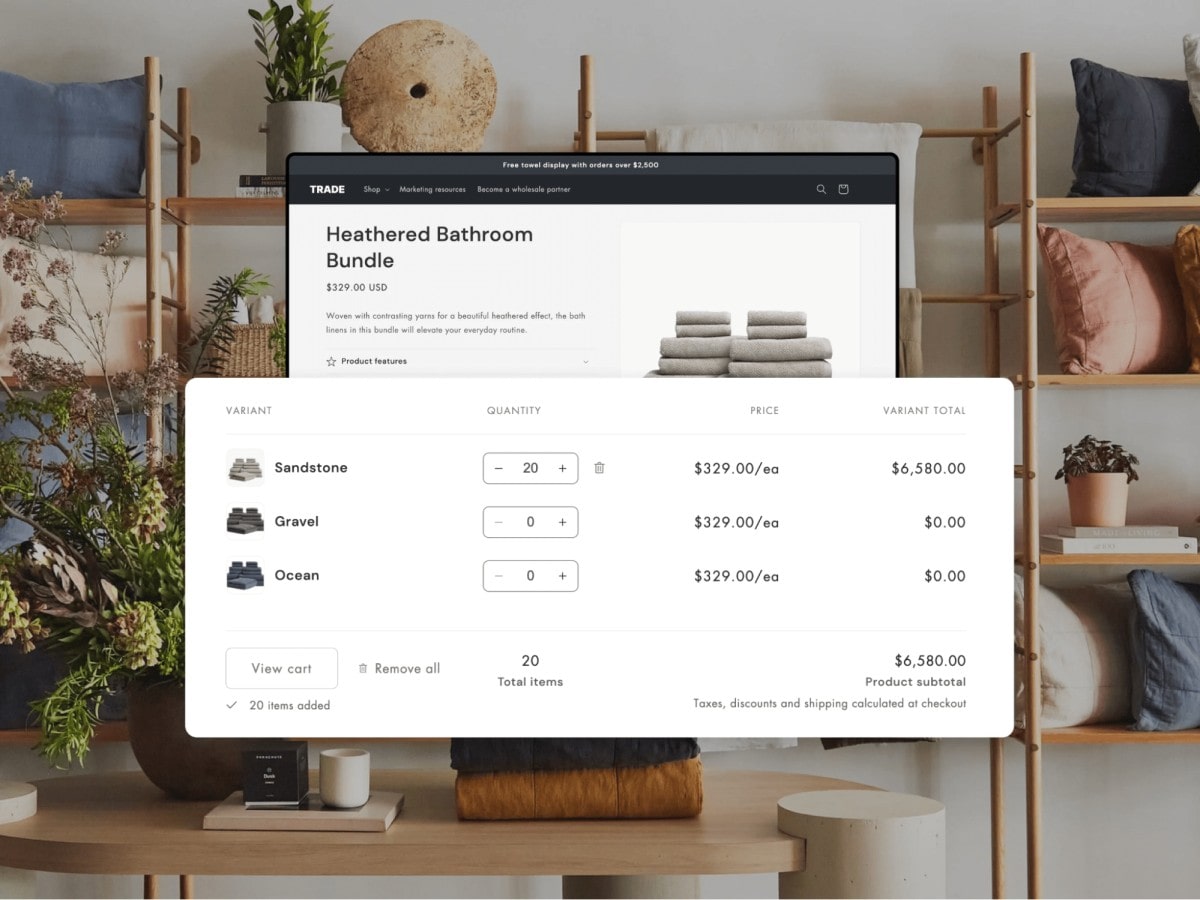
Image source: Shopify
Additionally, if a customer is looking to make a repeat purchase of their previous order, all they need to do is click “Buy Again” in their order history page and skip the manual process. Customisations can be made to the cart if needed, but ultimately this feature is perfect for customers who reorder the same stock from your store frequently.
Automated B2B Ecommerce Workflows
Looking for ways to automate your workflow and make operations more efficient? Shopify Plus for B2B has just the solution for you. Shopify Flow is an existing app made by Shopify and if you’re an ecommerce store owner, you may have already come across it. The app is designed to automate tasks and processes across online stores and for B2B stores, it offers a range of automations to make operations smoother. Automated B2B workflows that merchants can benefit from include automatically updating customers shipping addresses, automating notifications based on certain triggers and sending invoices.
Our Shopify Plus For B2B Development Experience
You might already use Shopify to manage your online sales and are probably already familiar with the simplicity of the platform and benefits it provides. Maybe you have an existing B2B portal on another platform or are looking to introduce B2B offerings to your business. If so, migrating to Shopify Plus using the right Shopify B2B ecommerce agency could be the perfect solution.
We helped a client migrate to Shopify Plus for B2B. They were struggling with the lack of features their previous B2B portal was offering them, so we did the research, found out what the best platform would be for them and proposed B2B on Shopify Plus. They were already using Shopify for their B2C website so were familiar with the interface and features, making the migration a seamless transition for them.
Developing a B2B Shopify Plus store was a learning experience for us as an agency, but a valuable one. There were various features that required us to develop our own knowledge and skills to efficiently deliver the project, one of which was developing new customer accounts on Shopify. Since B2B stores require customer accounts, but legacy accounts can’t be used, getting to grips with the new functionality was our only option to ensure the best technical implementation.
With a new customer account, the log in process is much more efficient and offers more features to customers, including saved payment methods and self-serve returns. After inputting their email address, rather than remembering a password, customers are sent a six digit code to access their account. This solution is much easier for B2B customers that have a central email address that multiple employees use. Rather than everyone remembering a communal password, the process is simplified but also much more secure.
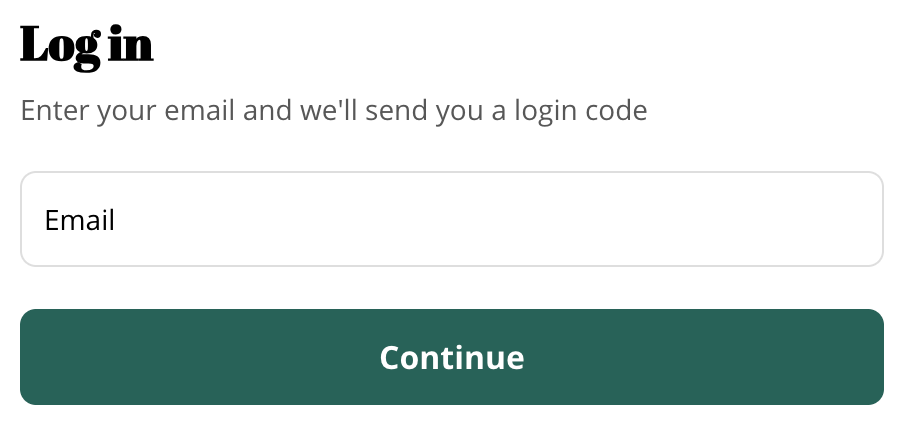
We also found that this solution made migrating our client’s trade portal from their previous platform to Shopify Plus more efficient. Usually when you migrate customer accounts to a new system, they’re required to create a new password which can cause problems for both the wholesaler and the customer. With a passwordless log in however, Shopify Plus eliminates the need for creating new passwords, reducing the chance of errors and improving user experience.
An important feature of Shopify Plus for B2B that our client required was having different catalogues per customer, with different products and pricing available for each. Each product on the website needed its own page, however the pricing needed to be hidden unless a customer was logged in to reveal the price dynamic to them. While this is possible with Shopify Plus, it wasn’t ‘out-of-the-box’ functionality and required our technical developers to build it with code. We wanted to ensure that we met our client’s vision by crafting a tailored technical solution that met their needs, while providing a seamless user experience.
This also involved getting the client set up with customer accounts, custom price listings and company profiles. This required our developers and data team to understand the process of importing data from their old platform to Shopify, using an app called Matrixify. While this was a challenge, we wanted to ensure that all data was correctly migrated so our client could provide a consistent and efficient shopping experience for their customers.
B2B Success With Shopify Plus
So is the B2B sales process still one of the biggest challenges B2B companies face? With Shopify B2B it’s certainly not. What was once a long and archaic process is simplified, streamlined and enhanced with Shopify B2B. With features like custom catalogues, self-service ordering and endless customisation options, Shopify Plus gives merchants the power to create a seamless and tailored B2B buying experience.
Saying goodbye to the inefficiencies of old school B2B sales processes and hello to an ecommerce platform that offers scalability and user friendly features not only improves operational efficiency but also strengthens customer relationships. So, if you’re ready to refresh your B2B sales strategy into something more powerful and flexible, Shopify Plus for B2B might just be the key you’re looking for.
